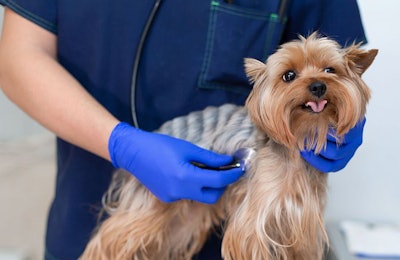
Doctors have found signs of coronavirus SARS-CoV-2 in only one pet, since the beginning of the outbreak. As of March 16, no other dogs and no cats have appeared with coronavirus on the World Organization for Animal Health (OIE) global list of animal disease outbreaks.
“Therefore, there is no justification in taking measures against companion animals which may compromise their welfare,” according to the OIE Questions and Answers on the 2019 Coronavirus Disease (COVID-19). “There is no evidence that dogs play a role in the spread of this human disease or that they become sick… While there is no evidence of a COVID-19 infection spreading from one animal to another, keeping animals that test positive for COVID-19 away from unexposed animals should be considered best practice.”
One dog, a Pomeranian in Hong Kong, tested positive for the coronavirus SARS-CoV-2 in late Feb. Health officials used real-time polymerase chain reaction (PCR) to find signs of the virus's genetic material. However, the dog showed no symptoms of COVID-19, the disease caused by the virus.
The results were described as a “weak positive” by Hong Kong’ Agriculture, Fisheries and Conservation Department. The American Veterinary Medical Association (AVMA) stated in a FAQ that it remains unknown if pets can actually be infected, but no evidence suggests dogs or cats can become sick from this coronavirus. Likewise, the Centers for Disease Control, OIE and World Health Organization (WHO) have no evidence that pets can be a source of SARS-CoV-2 infection or spread COVID-19 to people.
However, relatively few pets exposed to the disease have been evaluated. The AVMA noted that, as of March 11, testing for pets was unavailable in the United States. Scientists believe the dog in Hong Kong contracted the virus from its owner. Although this hasn’t been definitively proven, scientists have not found evidence that the virus can pass the other way, from pets to people. Nevertheless, doctors recommend against kissing, stroking, nuzzling or sharing food with pets, then washing hands after any contact to avoid any chance that the animals’ fur could harbor virus particles from other humans.
“While there has been one instance of a dog being infected in Hong Kong, to date, there is no evidence that a dog, cat or any pet can transmit COVID-19. COVID-19 is mainly spread through droplets produced when an infected person coughs, sneezes or speaks,” according to WHO.
About dog infected with coronavirus SARS-CoV-2
On Feb. 26, health officials in Hong Kong placed a dog under quarantine after hospitalizing its owner for COVID-19 coronavirus infection. Veterinarians confirmed that the coronavirus had infected the dog too after taking nasal, oral and rectal swabs, along with fecal samples. The OIE published a report of the emerging disease, listing this case as the first known in dogs.
Nasal and oral samples tested positive for the presence of severe acute respiratory syndrome coronavirus 2 (SARS-CoV-2), the name of virus responsible for COVID-19. However, the dog hasn’t shown any outward signs of illness. Follow-up oral and nasal samples taken on March 2 and 5 continues to test positive. Another dog is under quarantine in the same Hong Kong-Zhuhai-Macao Bridge animal keeping facility, but has not tested positive for the virus. Thomas Sit, DVM, chief veterinary officer and assistant director (inspection and quarantine) of the Department, reported the case.
View our continuing coverage of the coronavirus/COVID-19 pandemic.



















